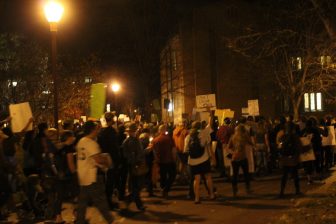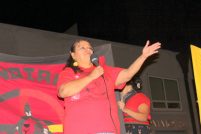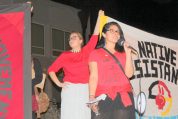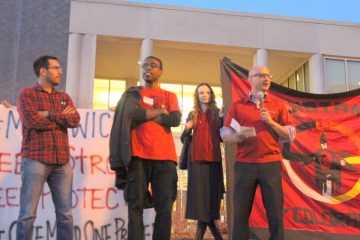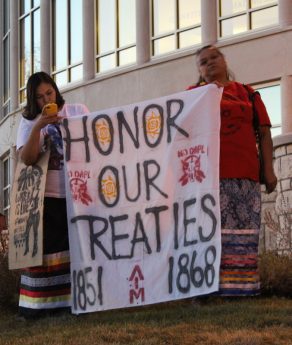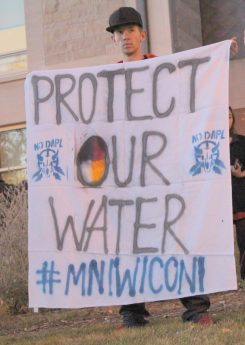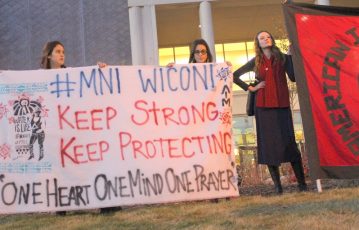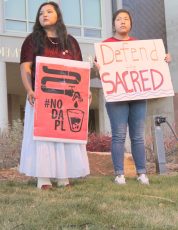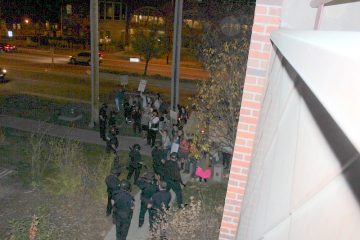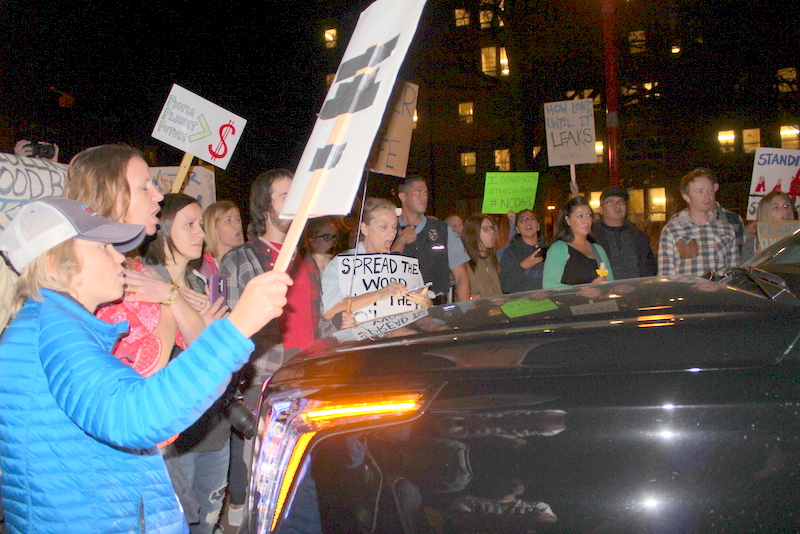
Protesters block the Cadillac SUVs of those participating in the 2nd Annual Pipeline Leadership Conference. Representatives from the controversial Dakota Access Pipeline were in attendance. (all photos: The Nation Report)
In some cities across the globe, the call was for President Obama to permanently reject the final permit of the Dakota Access Pipeline (DAPL) and for other cities it was to target financiers of the pipeline such as Citigroup, TD Securities, Wells Fargo, SunTrust, and other banks. But by chance, the 2nd Annual Pipeline Leadership Conference was happening at the University of Denver on schedule with the Day of Action to protest the pipeline. Michels Corporation and Enbridge Energy Partners, two companies significant to the construction of the DAPL were both in attendance to the conference. Michels Corporation is the contracting company and Enbridge Energy Partners has a 27% financial interest in the pipeline and also was behind the controversial Keystone XL Pipeline.
The Pipeline Leadership Conference was organized in partnership with Franklin L. Burns School of Real Estate and Construction Management at the Daniels College of Business at the University of Denver and was not affiliated with the Chancellor nor the
administration according to organizers.
A rally today was part of a 2-day occupation of the University of Denver and organized by the Native Student Alliance and allies to confront the pipeline conference. The message coming from about 1000 participants was that the conference was not a welcome event at their school.
If fully completed, the Dakota Access Pipeline would carry fracked crude oil from North Dakota to Illinois, crossing under the Missouri River. Front-line defenders of the Missouri River, the longest in the US, originates in Montana and provides water to twelve states after it joins the Mississippi River and eventually streams into the Gulf of Mexico. An encampment near Cannonball, North Dakota has been established since April of this year to confront and to attempt to block the construction of the $3.8 billion pipeline project.
The pipeline as constructed so far stands dangerously close to the drinking supply of the Standing Rock Sioux nation. An alternative route farther north of the capital Bismarck was rejected by local residents. An expected leak or spill would contaminate the water supply and the land but ancestral land including sacred ceremony sites and sacred burial sites have already been obliterated without tribal consent. The resulting trauma to the tribe and to supporters has fueled the level of activism and the numbers who turn out in support of the water protectors.
Company officials arrived in Cadillac SUVs and after the rally, those holding signs and chanting blocked the SUVs from leaving the parking lot to more directly deliver their message.
Students and non-students said they want to ensure that pipeline officials know that they are not welcomed at DU. People at the rally went a step further and called for a revocation of granted permits by President Obama and the US Army Corps of Engineers.
Protesters delivered to conference participants a letter of demand to be invited into and be heard during a “Pipelining the Next Generation” session being held Wednesday Nov. 16. During the delivery students took exception to the conference calling a session scheduled for Wednesday a “community” gathering, “They claim they are in communication with the community, but did you get an invitation? I didn’t either!”
Earlier in the day the rally gathered at the Anderson Academic Commons of DU which gained steam as the afternoon and evening approached. 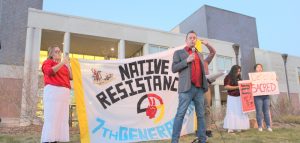 Billy Stratton, Associate Professor of English took the mic to remind the pipeline executives that “in North America from 1778 to 1868 the United States signed almost 400 treaties with Native nations throughout the contiguous North America. In these treaties $1.5 billion acres of land was ceded, 2 million square miles. That’s two-thirds of the “Lower 48. The US courts have repeatedly upheld both state, district, and the US Supreme Court the Reserved Rights of native people of North America. Sioux Nation versus United States which is relevant to this crowd in terms of the Fort Laramie Treaties of 1851 and 1866. The US Supreme Court admitted in 1980 that those stipulations were in force even today. One of the things that this demonstration insists is that in addition to an appeal for right, ethical and moral action, is the adherence to the laws of the United States of America as they are set down in the US Constitution. That’s what the people in this building, this conference need to hear.”
Billy Stratton, Associate Professor of English took the mic to remind the pipeline executives that “in North America from 1778 to 1868 the United States signed almost 400 treaties with Native nations throughout the contiguous North America. In these treaties $1.5 billion acres of land was ceded, 2 million square miles. That’s two-thirds of the “Lower 48. The US courts have repeatedly upheld both state, district, and the US Supreme Court the Reserved Rights of native people of North America. Sioux Nation versus United States which is relevant to this crowd in terms of the Fort Laramie Treaties of 1851 and 1866. The US Supreme Court admitted in 1980 that those stipulations were in force even today. One of the things that this demonstration insists is that in addition to an appeal for right, ethical and moral action, is the adherence to the laws of the United States of America as they are set down in the US Constitution. That’s what the people in this building, this conference need to hear.”
“The 1851 Fort Laramie Treaty has never been abrogated. The 1868 Fort Laramie that established the great Sioux Reservation which include the lands that you are here to support that the Dakota Access Pipeline is violating, that still stands as a legal basis. And according to those treaties that land was set apart ‘for the absolute and undisturbed use and occupation of the Sioux Nation and that no treaty for the cessation of any part of the reservation would be valid against the Sioux unless and signed by at least three-fourths of the adult male Sioux population.’ [In] 1861 gold is discovered and the treaty begins to be violated.”
 The rally marched to the corner of Evans Avenue and University Boulevard to take over the intersection for 15 minutes. Blocking Evans Avenue in particular had significance in Colorado history since once Governor John Evans played a role in the 1864 Sand Creek Massacre of Cheyenne and Arapaho.
The rally marched to the corner of Evans Avenue and University Boulevard to take over the intersection for 15 minutes. Blocking Evans Avenue in particular had significance in Colorado history since once Governor John Evans played a role in the 1864 Sand Creek Massacre of Cheyenne and Arapaho.
The mass then returned to block the entrances of the Joy Burns Building where the pipeline conference was taking place. 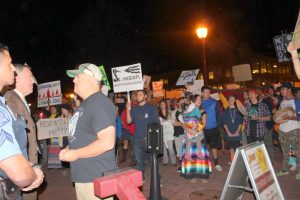 Security met the group and prevented the community from entering the building. In protest they chanted “DAPL, DAPL you can’t hide! We can see your racist side!” The group remained for about a half hour when participants of the pipeline conference left the building and attempted to leave the premises. Protesters blocked vehicles of pipeline conference attendees while vehicle occupants called police. About 30 riot police arrived and escorted two Cadillac SUVs off of school grounds. No arrests took place and no violence was reported.
Security met the group and prevented the community from entering the building. In protest they chanted “DAPL, DAPL you can’t hide! We can see your racist side!” The group remained for about a half hour when participants of the pipeline conference left the building and attempted to leave the premises. Protesters blocked vehicles of pipeline conference attendees while vehicle occupants called police. About 30 riot police arrived and escorted two Cadillac SUVs off of school grounds. No arrests took place and no violence was reported.
“It’s time that the larger Colorado community start putting our bodies on the line in our own communities to show true solidarity with Standing Rock because complacency is in itself an act of violence,” said Sky Roosevelt Morris of the American Indian Movement of Colorado, “When we’re complacent in our own communities we’re no better than the attendees of the pipeline conference or those proponents of the Dakota Access Pipeline.”
Groups in Colorado drew parallels between the Dakota Access Pipeline and their own local struggles to protect their communities from fracking and other fossil fuel projects. In Boulder a packed Boulder County Commissioners meeting drew hundreds to speak for extending a moratorium on fracking.
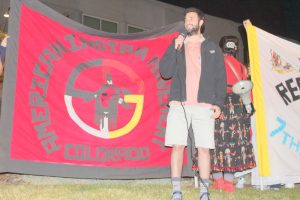 “In addition to being an industry that is terrible for the environment, fossil fuel companies are incredibly corrupt. They fund politicians to make legislation in their favor, they exploit small communities here in Colorado and across the country in addition to in Standing Rock, and they spread lies in the media. It’s clear where their values are, and as a millennial, I do not want fossil fuels to be part of my future,” said Divest DU student leader Danny Brown, who encouraged rally participants to sign a “Pledge to Divest” from fossil fuel companies and the banks that fund projects like the Dakota Access Pipeline and to reinvest in renewable energy and other socially responsible solutions to the climate crisis. “My generation is in near consensus on this issue. The DU Board of Trustees has an opportunity to divest from fossil fuels this coming January, and we students pray that our elders will lead with us.”
“In addition to being an industry that is terrible for the environment, fossil fuel companies are incredibly corrupt. They fund politicians to make legislation in their favor, they exploit small communities here in Colorado and across the country in addition to in Standing Rock, and they spread lies in the media. It’s clear where their values are, and as a millennial, I do not want fossil fuels to be part of my future,” said Divest DU student leader Danny Brown, who encouraged rally participants to sign a “Pledge to Divest” from fossil fuel companies and the banks that fund projects like the Dakota Access Pipeline and to reinvest in renewable energy and other socially responsible solutions to the climate crisis. “My generation is in near consensus on this issue. The DU Board of Trustees has an opportunity to divest from fossil fuels this coming January, and we students pray that our elders will lead with us.”
“We’re proud to stand in solidarity with indigenous leaders locally and in North Dakota who are leading the fight against this pipeline, the companies and banks enabling it, and the threats to indigenous people’s rights, land, water and our global climate,” said Micah Parkin with 350 Colorado. “The struggle against the fossil fuel industry for the fate of our planet is one that affects all of us. Many Colorado communities have pipelines, fracking wells, or other fossil fuel infrastructure we’re struggling against in our own backyards, and it’s more important than ever that we fight these projects. To see such deep and powerful opposition at Standing Rock is in inspiration for us all.”
Alan Gilbert, also a professor at DU wrote in his blog,
“The whole world is watching. And everyone, including businesses who are alive (not including those who organized this conference) know that the only future- humanity’s future – is with solar and wind…”


